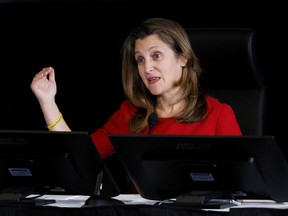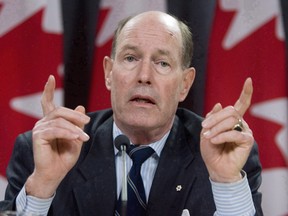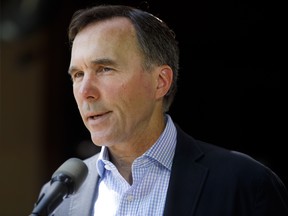Ottawa’s inconsistent commitment to fiscal prudence is beginning to trouble some members of the Liberal family

Article content
A growing chorus of voices associated with the Liberal camp are raising the alarm about the nation’s finances, adding to the pressure on Finance Minister Chrystia Freeland to restrain her colleagues’ propensity to spend.
Advertisement 2
Article content
The federal government’s response to the COVID crisis caused the deficit to widen to $328 billion, or 14.9 per cent of gross domestic product, the highest since 1945.
Article content
Some partisan opponents, most notably the Conservatives, soon began pounding the table for austerity. Freeland acknowledged that her spending had limits, setting out a plan for returning federal finances to balance in last year’s budget and Fall Economic Statement. But at the same time, she also announced ambitious goals and measures related to the green transition and housing affordability that will cost taxpayers hundreds of billions of dollars.
Article content
The Trudeau government’s inconsistent commitment to fiscal prudence is beginning to trouble some members of the Liberal family, and not just the prime minister’s vocal foes. Freeland’s predecessor, Bill Morneau, cautioned his former colleagues against growing overly ambitious with new goals and programs, given the lack of fiscal capacity and a recession looming on the horizon.
Advertisement 3
Article content
“We can’t deal with all of those (priorities) without having some restraint in some places,” Morneau said at an event at Toronto Metropolitan University on Jan. 24. “We need to have targets of what we want to do fiscally, we need to decide places where we’re going to play in, places where we’re not going to play.”
Dodge’s bullet
If Morneau was a lone voice, he might be easy for Prime Minister Justin Trudeau to dismiss. Morneau is promoting a book that is critical of his former boss, and he resigned amid an ethics scandal in the summer of 2020. He’s a flawed critic.
But Morneau has backup. Former Bank of Canada governor David Dodge, a respected voice in policy circles, also argued that there were growing risks to the economic outlook that could throw the government’s finely laid path back to balance off track.
Advertisement 4
Article content

Dodge, who was deputy finance minister when Jean Chrétien’s Liberal government ended a generation of budget deficits in the mid-1990s, released a report that concluded that Ottawa’s fiscal balance was unsustainable over the next decade, as both debt as percentage of GDP and interest charges as a percentage of revenue were on track to reach dangerous levels.
“Clearly, the ballooned levels of debt and deficits in (fiscal year) 2021-22 that resulted mainly from spending increases in 2020 are unlikely to be sustainable,” Dodge, now senior advisor for law firm Bennett Jones LLP, wrote in the report. “Action to restore a sustainable balance between revenue and expenditure was, and continues to be, required.”
While Dodge sees the debt-to-GDP ratio reaching pre-COVID levels in his base case scenario, he and his team pointed to risks like increased fiscal spending, a recession, continued supply constraints — or a combination of all of these risks. Dodge authored the report alongside fellow Bennett Jones adviser Richard Dion. They collaborated with Robert Asselin of the Business Council of Canada, who used to advise Morneau.
Advertisement 5
Article content
Et tu, Carolyn?
Canada’s precarious budget trajectory was also an issue at the cabinet retreat in Hamilton, Ont. Former Bank of Canada senior deputy governor Carolyn Wilkins was invited to brief Trudeau and his ministers, and she flagged the risk of a mismatch between fiscal and monetary policy if the government continued to spend liberally.
While Wilkins held an optimistic view of the overall fiscal plan, she emphasized that government spending plays an important roll in stabilizing inflation because of its influence on demand. Without budget constraint, the Bank of Canada might have to keep raising interest rates in order to get inflation back to its two per cent target, which would leave highly indebted Canadian households vulnerable.
“We don’t want more interest rates increases than are absolutely necessary to get back to where we need to go, and one of the reasons is household debt is just so high,” Wilkins told reporters on Jan. 24. “And that means that relative to the past when we saw increases in interest rates, the impact on Canadians — and therefore the economy — is just so much greater.”
Advertisement 6
Article content
‘Still a lot of uncertainty’
None of this would have been news to Freeland, and she even echoed some of the sentiments of her critics in her comments to reporters at the Hamilton meeting.
“There is still a lot of uncertainty in the world economy, and that means that we do need to continue to take a fiscally prudent approach,” Freeland said on Jan. 24. “We still do not know for sure how the plane is going to land. We do not know for sure how the COVID recession is going to finally play out.”
At the time of the fiscal update in the fall, Freeland emphasized the need to strike a balance between fiscal discipline and providing support for Canadians suffering from surging inflation. She said she was cognizant that too much spending on her part would make the Bank of Canada’s job more difficult.
Advertisement 7
Article content
-
![Finance Minister Chrystia Freeland has told Bank of Canada governor Tiff Macklem that the government will amend legislation so that the central bank can keep earnings to offset its losses.]()
Chrystia Freeland finally offers plan to help Bank of Canada cover its losses
-
![Bank of Canada governor Tiff Macklem went out on his own in July when he raised the benchmark rate a full percentage point. Now he has been the first to press pause.]()
Kevin Carmichael: Bank of Canada emerges as the trendsetter on interest rates
-
![The Bank of Canada headquarters in Ottawa.]()
FP Explains: Breaking down the Bank of Canada’s January hike. Could this be the last?
Still, the Fall Economic Statement included billions in new spending for programs like Workers Benefit payments and the Canada Dental Benefit. The government also has its sights on goals such as addressing climate change and housing affordability.
Not all spending is created equal. Wilkins emphasized that some programs have a muted impact on demand because they are rolled out gradually and eventually increase economic growth, boosting the country’s capacity to keep up with demand.
Advertisement 8
Article content
“That growth that we can have without creating inflation by increasing the supply and the productive capacity of the economy, and so I would urge everybody when they look at what government expenditures are happening to think about it through that lens,” Wilkins said.
‘Can’t do everything’

While Morneau supports the idea of dental care, he noted that the push to do pharmacare at the same time could be more than the system can stand, given all the threats the country must manage over the next few years.
“You have to figure out what is the first order of business and get at that, and recognize that you just can’t do everything as much as you might like to and you certainly can’t do everything all at once,” Morneau said. “I would argue for setting clear targets for trying to limit the number of things you’re trying to go after any one particular time.”
Advertisement 9
Article content
By trying to do too much, the Trudeau government risks losing difficult political ground that it has already taken. At the Toronto Metropolitan University event, Morneau said the Liberal government’s carbon tax — the centrepiece of its climate strategy — could still be scrapped given the lack of political consensus both federally and provincially. The Conservative Party, which has re-emerged as a legitimate contender for power, has vowed to repeal the measure.
The next federal budget is expected to be tabled sometime in the spring.
• Email: [email protected] | Twitter: StephHughes95
For all the latest Business News Click Here
For the latest news and updates, follow us on Google News.





